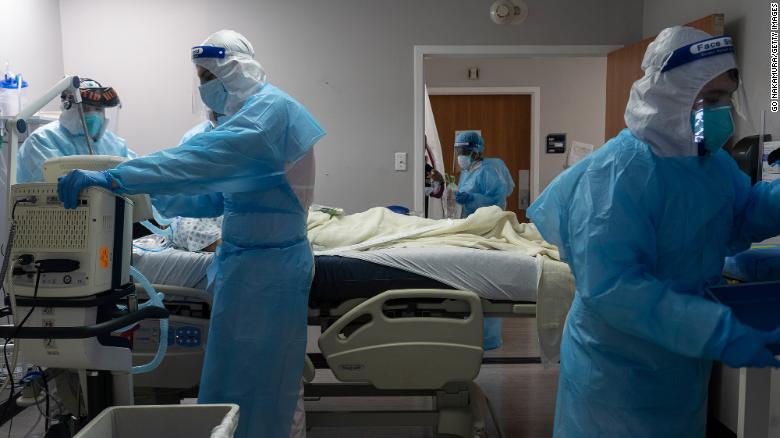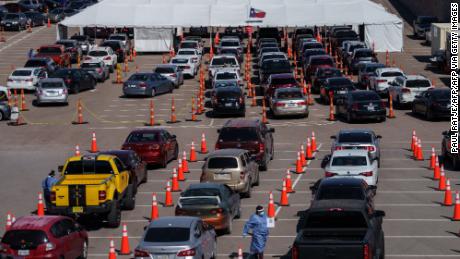El Paso, Texas (CNN)The glowing lights of arcade machines flash on and off across a silent room. A small carousel stands idly by, its colorful horses frozen in time.
Gone are the sounds of buzzers, ringers, and skee balls at Peter Piper Pizza. Instead, a man paces around with a loud machine, dousing the room with disinfectant spray.
"It's downright sad," said John Hlamquist, president of Pizza Properties, which owns the restaurant and other locations in El Paso. "You'd come in here on a Saturday, this place would be full."
Meanwhile, at a church across town, a trumpeter plays through a tiny hole in his surgical mask, while Bishop Mark Seitz walks down the aisle to hold mass before empty pews. This bishop is taping the service to air on Univision, so his parishioners don't put themselves at risk.
These are some of the many scenes from El Paso, an area under lockdown amid a surging Covid-19 outbreak. Pockets of the county feel ghostly as the normally vibrant culture here returns to what so much of the country experienced this past spring: closed storefronts, overwhelmed hospitals and mobile morgues.
Businesses struggle amid shutdown as virus rages on
Defying orders from Texas Gov. Greg Abbott, County Judge Ricardo Samaniego issued a two-week shutdown of nonessential businesses last month. He's expected to extend it on Wednesday, as the number of cases and hospitalizations have continued to increase.
Places like tattoo parlors, hair salons, nail salons, gyms and massage businesses are shuttered. Restaurants can stay open only for curbside and delivery orders.
It was a frightening order for some small businesses that are still struggling to stay afloat amid the pandemic-stricken economy. And it has larger businesses, like Peter Piper Pizza, concerned about its employees.
"If we don't have hours to give them because we can't serve customers, they don't get paid. And I think that's what kind of gets lost in all this," said Hlamquist. "Our team members don't have paychecks."
Hlamquist's company has teamed up with other businesses in a lawsuit seeking to block the judge's order while they ask the courts to resolve whether state or local government has the authority to shut down businesses. The Texas Attorney General's office has also joined the lawsuit.
Abbott -- who has refused to grant county judges authority to initiate shutdowns -- described Judge Samaniego's order as illegal, arguing there are better strategies to mitigate the crisis.
As the fight continues in the courts, the virus rages on across the area. As of Wednesday, the county reported 29,118 active cases, meaning close to 1 in 30 people have recently tested positive.
More than 860 of those cases were newly reported on Wednesday, while over 1,000 people are hospitalized with the virus, according to data from the County and City of El Paso. Close to 300 are in the ICU.
Outside the medical examiner's office are six mobile refrigerated units that can hold 176 bodies. More units are expected to arrive.
The state has flooded the area with resources, building a makeshift hospital at the convention center, as well as tents outside of hospitals to treat patients with Covid-19.
The governor also deployed nearly 1,400 personnel to the region, and the US Department of Defense has sent medical military personnel to support the hospitals. Meanwhile, dozens of non-Covid-19 patients have been air-lifted to other hospitals in Texas and New Mexico to create space.
Officials attribute the sharp increase to a range of factors, from Covid-19 fatigue to the reopening of businesses to the family-oriented culture, where large families living in the same households is common.
The rising number of cases is the reason why El Paso County Commissioner David Stout is so supportive of the judge's order to close down non-essential businesses, arguing officials need to get the crisis under control before federal and state resources are needed in other parts of the state.
"When things start getting worse everywhere else, people are going to have to go back to those other places," Stout said. "And then what's going to happen in El Paso? We not only don't have enough health care professionals that are here, but then we're going to start losing those that are here helping us."
'You cannot bring my son back'
Texas became the first state on Tuesday to surpass 1 million cumulative cases since the start of the pandemic. The state has had 19,342 coronavirus-related deaths as of Wednesday, according to Johns Hopkins University data.
For Texans who lost a loved one to Covid-19 this year, the resurgence of the virus has sharpened the already-painful mourning process.
Minerva and Francisco Morales' son Daniel, a nurse, died in August -- just weeks before his 40th birthday. He left behind a wife and four children. On July 6, Daniel dropped his children off with his parents, said goodbye, and went to work.
"That was the last time we saw him. That's the last time his children saw him," his mother said. She added that Daniel first completed his shift and finished taking care of his dialysis patients before he took himself to the emergency room that same day.
Daniel Morales was in the hospital for 29 days before he succumbed to the virus, according to his family.
His family gathered outside the hospital every night to pray, folding their hands into the shapes of hearts and lifting them into the air.
His parents keep a small shrine with his ashes in their house. Sitting next to the urn is a box of colorfully-painted rocks. His children were planning to welcome him home from the hospital with a rock garden.
Minerva said she's devastated by the debate taking place over how to handle the economy during the pandemic. For her, it's no question that every precaution should be taken, no matter the economic cost.
"We have an empty chair. Now we have a void that will never be filled. And you know what? If I lose my house, if I lose my car, I'll replace it," she said. "But you cannot bring my son back. You can't. And they're arguing over this. And it makes me angry.










